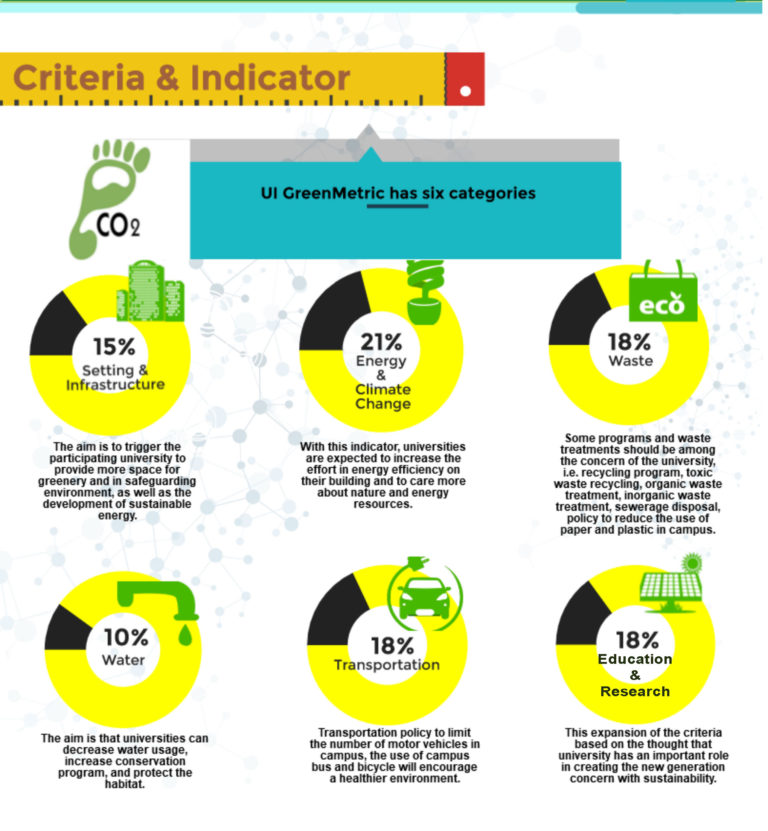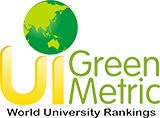NURE positions in UI GreenMetric World University Rankings (tab UI GreenMetric World University Rankings)
Origins of the ranking
The UI GreenMetric World University Ranking is an initiative of Universitas Indonesia which is being launched in 2010. As part of its strategy of raising its international standing, the University hosted an International Conference on World University Rankings on 16 April 2009. It invited a number of experts on world university rankings such as Isidro Aguillo (Webometrics), Angela Yung-Chi Hou (HEEACT), and Alex Usher (Educational Policy Canada). It was clear from the discussions that current criteria being used to rank universities were not giving credit to those that were making efforts to reduce their carbon footprint and thus help combat global climate change. We were aware that a number of top world universities, for example Harvard, Chicago, Copenhagen have been taking steps to manage and improve their sustainability. There are also cooperative efforts among groups of universities. A grading system which includes information on sustainability at 300 universities exists under the title the United States Green Report Card. This is excellent, however, results are given in terms of a grade (A to F) rather than a ranking and the number of universities included is relatively circumscribed. We saw the need for a uniform system that would be suitable to attract the support of thousands of the world’s universities and where the results were based on a numerical score that would allow ranking so that quick comparisons could be made among them on the criteria of their commitment to addressing the problems of sustainability and environmental impact.
Aim of the Ranking
The aim of this ranking is to provide the result of online survey regarding the current condition and policies related to Green Campus and Sustainability in the Universities all over the world. It is expected that by drawing the attention of university leaders and stake holders, more attention will be given to combating global climate change, energy and water conservation, waste recycling, and green transportation. Such activities will require change of behavior and providing more attention to sustainability of the environment, as well as economic and social problem related to the sustainability. We believe that the universities that are leading the way in this regard need to be identifiable and so we have decided to make a start in doing this. Initially, we will collect numeric data from thousands of universities world wide and process the data provided to arrive at a single score that reflects the efforts being made by the institution to implement environmentally friendly and sustainable policies and programs. Universities will be ranked according to this score. We hope that the rankings will be useful to university leaders in their efforts to put in place eco-friendly policies and manage behavioral change among the academic community at their respective institutions.
Future development of and improvements to the Ranking
We are using a set of criteria and methodology that has been carefully thought out to be simple and easy enough to fill in without an inordinate amount of effort, but at the same time, provide information on key indicators. We are aware that critical examination of the data collection instrument will yield insights that can help improve it. Therefore we have already given the questionnaire to an independent review board and will welcome comments from participants that can be used to improve and refine it in subsequent versions.
Creating the ranking
We are inviting thousands of universities around the world to take part. These universities include many which already have a presence in other World Universities Rankings, such as THES-QS, Webometrics, and Shanghai Jiao Tong ranking. Universities that wish to participate are asked to provide numeric data on a number of criteria that can give a picture of their commitment to the greening of their campus and putting in place environmentally friendly policies that support sustainability. The criteria include such baseline information as the size of the university, both spatially and in terms of population, the campus location and the amount of green space; and also information on energy use, transport, water use and recycling and waste treatment. In addition, it will ask about efforts being made by the institution towards establishing green policies and management.
Participating
It is easy to take part. Universities can submit data by filling in our online survey form. The process is relatively simple and not terribly time consuming. We believe that the short time and small effort put in will more than reward all those who are interested in sustainability issues. The period for submitting data through the online form will run from the present up to near the end of the year. We will then calculate the scores for all the universities who have submitted data and publish the resulting rankings in December.
In order to raise awareness and interest in the SDGs, a permanent Workshop on Sustainable Development Goals (SDGs). The objectives of NURE to implement the SDGs has been established at our university. At the event, presentations by scientists working on issues related to the SDGs will be presented, recommendations on how to achieve the SDGs by the university will be developed, discussions on the implementation of the SDG achievement tools will be held. The priority of this initiative is to provide an analytical and systematic approach in studying the problems and opportunities of the university in achieving specific SDGs.


